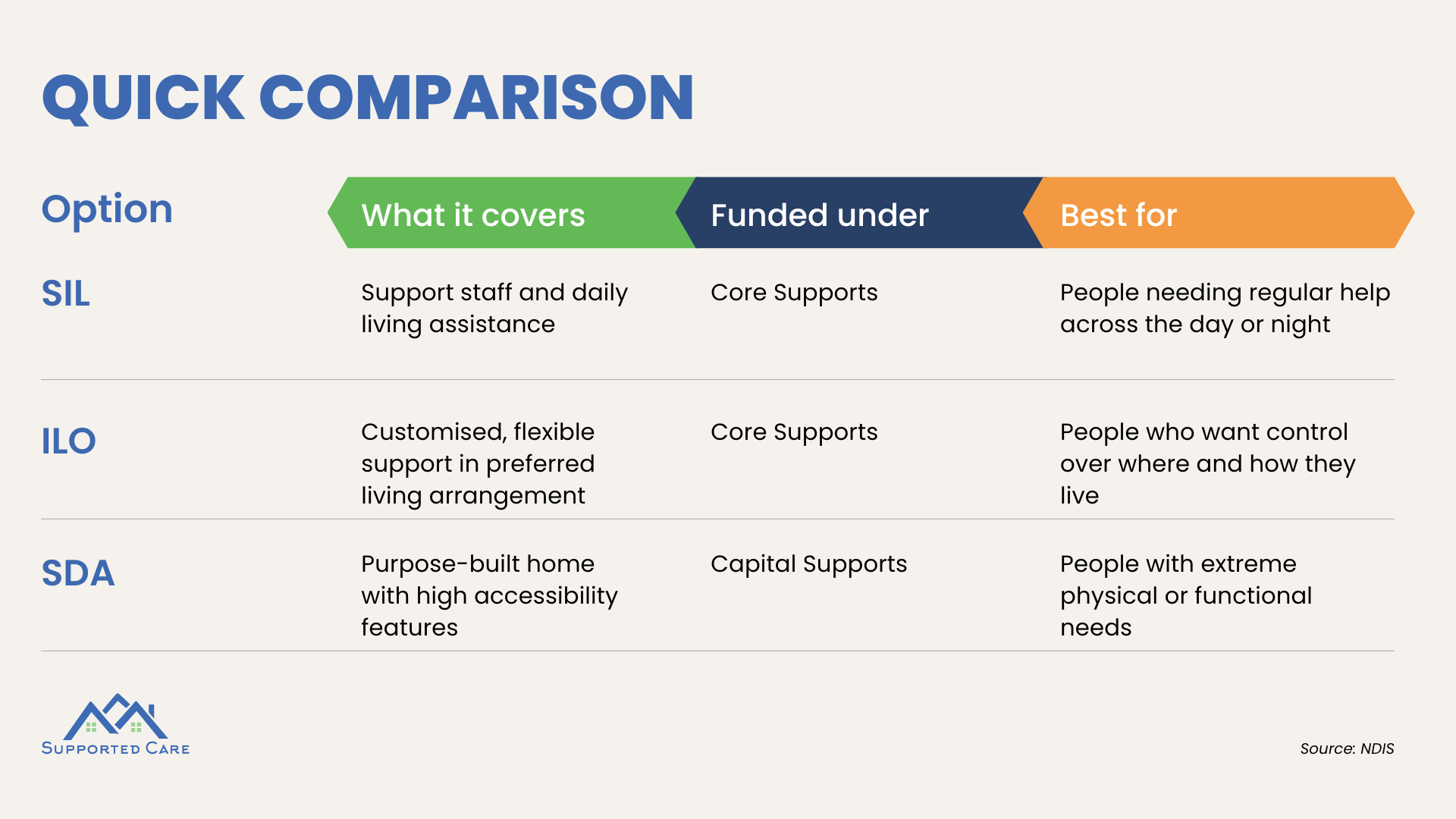Choosing the right NDIS support can be overwhelming. Here's a clear breakdown to help you decide with confidence.
At Supported Care, we understand that navigating housing and support options under the NDIS can feel confusing. You may have heard about SIL, ILO or SDA. But what do they actually mean, and how do they work together?
Each option is designed to support people with disability in different ways. Understanding the difference can help you, your family or your support coordinator make informed decisions about where to live and how to receive the right support.
Let’s unpack what makes Supported Independent Living (SIL), Individualised Living Options (ILO) and Specialist Disability Accommodation (SDA) unique, and how to decide which one could be the right fit.
Supported Independent Living (SIL)
Supported Independent Living is a structured support model for people who need regular help with daily living. This may include:
- Personal care
- Meal preparation
- Cleaning and laundry
- Medication reminders
- Daily routines
SIL is usually provided in shared homes, where each person has their own room and shares common areas. A rostered team of support staff is present day and night to ensure help is always available.
SIL is best for people who need moderate to high support on a daily basis.
For example, Ben lives in a Supported Care home with two others. He receives assistance every morning and evening, with staff on standby overnight. This setup gives him a sense of stability and helps him build life skills.
SIL is funded under the NDIS Core Supports category, specifically under Assistance with Daily Life.
Individualised Living Options (ILO)
ILO is a flexible support model that gives participants greater control over their living arrangements. Unlike SIL, it is not tied to a shared home or 24-hour rostered care. Instead, the participant works with their provider to design a personalised living setup based on preferences, relationships and goals.
This could involve living with a friend, a trusted host, or independently with occasional check-ins. ILO support is typically not round-the-clock but is tailored to the participant’s lifestyle and built around meaningful routines and community inclusion.
ILO is delivered in two stages. First is the exploration and design phase, where the participant maps out their preferred arrangement. The second stage funds the supports that make that arrangement possible.
For example, Jasmine lives in a quiet unit adjacent to her host family’s home. She prefers privacy and structure, so she designed an ILO arrangement that includes three support visits per week to help with shopping, budgeting and planning her meals.
ILO is funded under Core Supports, specifically under Home and Living Supports.
Specialist Disability Accommodation (SDA)
SDA refers to the physical home itself, not the support delivered within it. It is for participants with very high physical needs or extreme functional impairment. SDA homes are specially designed to promote safety and independence, often including features such as wider doorways, ceiling hoists, reinforced walls, accessible bathrooms and smart home systems.
SDA is about providing a specialist-built environment, and it is most effective when paired with a support model such as SIL or ILO, depending on the participant’s needs. It is important to understand that SDA only funds the dwelling, not the care or personal support you receive inside that home.
SDA does not cover the cost of personal support services. It covers only the home. SIL or ILO may still be used alongside SDA to provide day-to-day support within that home.
Example
Mohamad uses a wheelchair and requires full physical access. He lives in an SDA-approved unit with accessible kitchen counters, an automatic front door and ceiling hoists in the bedroom and bathroom. Mohamad also receives SIL support from a team who assist him throughout the day and overnight.
SDA is funded through the Capital Supports budget in your NDIS plan. It is only available to participants who meet specific eligibility criteria.
Are These All Supported by the NDIS?
Yes. SIL, ILO and SDA are all recognised and funded by the NDIS. Each one covers a different part of the support or housing arrangement.
- SIL and ILO are funded through Core Supports. These cover the daily support a person receives
- SDA is funded through Capital Supports. This covers the physical home if a participant has very high support needs
For example, Dan lives in a purpose-built SDA home due to his physical condition. He also receives SIL support for his daily needs. Meanwhile, his friend Sarah lives in a private rental under an ILO arrangement with a flexible support schedule. Both have different setups, but each is fully funded under the NDIS in a way that fits their unique needs.

How Supported Care Helps
At Supported Care, we take time to understand your needs and walk with you through every step. Whether you are exploring housing for the first time or planning a change in your current setup, we help you match the right model to your goals.
Our role is not just to provide services. We help you make sense of your NDIS plan, explore what is possible and create a support system that fits you, not the other way around.
Speak to our team today
Call (07) 3189 4877
All information in this article is based on official guidance from the National Disability Insurance Scheme (NDIS).